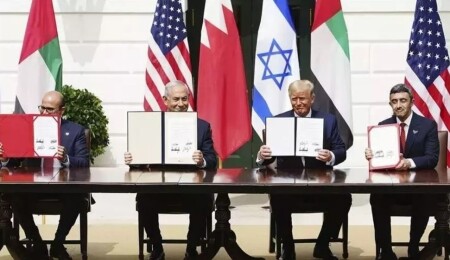US, Israel Seek to Expand Abraham Accords

U.S. President Donald Trump said more countries are interested in joining the Abraham Accords, the Washington-brokered normalization initiative between Israel and several Middle Eastern nations.

Asked during a press briefing in the Oval Office whether he deserves the Nobel Peace Prize, Trump responded, “Maybe for the Abraham Accords.”
He reiterated that additional countries are expected to normalize relations with Israel through U.S. mediation.
“We are going to be filling it up very rapidly… A lot of countries want to come into the Abraham Accords,” he said.
The Abraham Accords, launched in 2020, marked a breakthrough in normalization between Israel and several Arab nations. Initially signed with the United Arab Emirates and Bahrain, the process later included Sudan and Morocco. The agreements were largely the result of intensive diplomatic efforts by the Trump administration in his first time at the White House.
In an interview with Time magazine published on April 25, Trump expressed confidence that “Saudi Arabia will go into the Abraham Accords.”
Next month, Trump is scheduled to visit Saudi Arabia, Qatar and the United Arab Emirates for meetings with regional leaders.
Meanwhile, one important new potential participant in the Abraham Accords is Syria.
Two U.S. congressmen who visited Damascus last week said Syrian leader Ahmad al-Sharaa is open to the idea of normalization with Israel.
“Sharaa said that he was open to the Abraham Accords, which would put them in good standing with Israel, other Middle Eastern countries, and, of course, the United States,” Republican Indiana Representative Marlin Stutzman told the Jerusalem Post in an interview.
Stutzman, along with Republican Florida Representative Cory Mills, met with the Syrian president in Damascus on April 19.
According to Stutzman, Sharaa laid out Syria’s conditions for normalization — most importantly, that Syria must remain a unified and sovereign state.
“Sharaa’s concerns are that the country of Syria would be divided up into regions. He didn’t want to see that happen,” Stutzman said.
“He wanted to see the country of Syria stay unified. He also mentioned that Israel’s encroachment near the Golan Heights must be addressed and there should be no further bombings in Syria by Israel. I truly believe he is open to dialogue.”
Speaking to Bloomberg, Mills confirmed that the Syrian leader conveyed Damascus’ willingness to join the Abraham Accords if the right conditions are met.
Sharaa also confirmed in an interview with The New York Times that the U.S. has presented certain demands in exchange for normalization, though he said some of those conditions need to be revised, without providing specifics.
There is a growing belief that a step toward normalization with Israel could help lay the groundwork for more stable relations with Washington.
Washington, for its part, sees the potential for the Abraham Accords to extend not only to Arab states but also to non-Arab Muslim-majority countries.
Israeli Prime Minister Benjamin Netanyahu is expected to visit Baku in the coming days, in a diplomatic push to both ease Israeli-Turkish tensions over Syria and promote Azerbaijan’s integration into the accords.
Netanyahu, alongside Foreign Minister Gideon Saar, has advocated for expanding the accords beyond the Arab Sunni world, identifying Azerbaijan as a key candidate.
In a March 5 address to the Israeli parliament, Netanyahu reaffirmed Israel’s commitment to a trilateral alliance with Baku and Washington.
Source: Reuters


Comments
Attention!
Sending all kinds of financial, legal, criminal, administrative responsibility content arising from illegal, threatening, disturbing, insulting and abusive, humiliating, humiliating, vulgar, obscene, immoral, damaging personal rights or similar content. It belongs to the Member / Members.